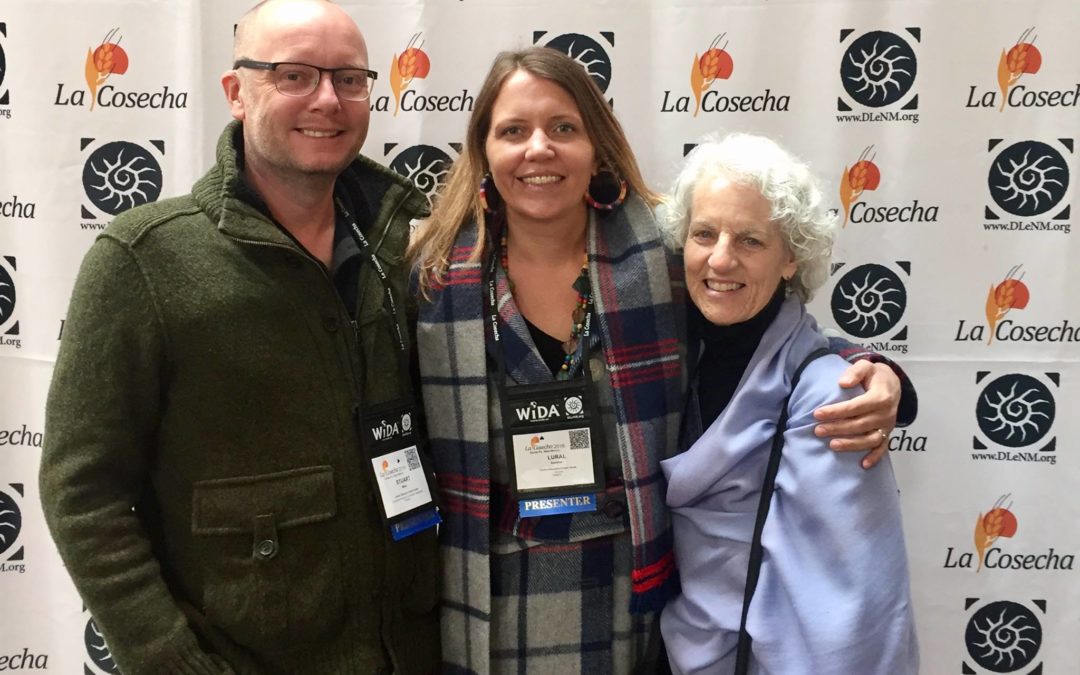
by Stuart Millar, IB coordinator | Dec 1, 2016

At the beginning of November, Santa Fe in New Mexico was taken over by La Cosecha Dual Language Conference. More than 2,500 educators, researchers, and advocates for dual language education gathered to attend a number of talks, workshops, and social events to learn and share their expertise. Futuro Verde was selected to present at this prestigious event, with Lural Ramirez, Eileen Walschmidt, and Stuart Millar delivering a presentation titled, “Futuro Verde – Research and Teacher Education Opportunities.”
This was a valuable opportunity for Futuro Verde in many different ways. Conferences such as these keep us current, giving us access to the latest research and new teaching methods that will directly benefit our teachers and students. Also, La Cosecha gave us an opportunity to promote our school and the work we do so that educators from other countries and schools can also learn and grow in some way from our experiences, successes, and challenges. Collaboration and working in groups is something we believe in for our students to be successful in class and for our teachers to be able to offer the best learning experience. This was our opportunity to collaborate on a much bigger scale. By inviting researchers and educators to come to Futuro Verde we can: bring experts to our school; perhaps answer some big questions we have about our dual language program and how to advance it further; and contribute to the research and knowledge of others, impacting teachers and students globally and in the future.
There were numerous sessions available to the attendees. Stuart particularly enjoyed “Comparative literature: a path to enhance biliteracy and intercultural awareness” to learn more ways to connect our English and Spanish literacy classes, while Lural was inspired by a presentation on translanguaging to mold and design a future additional language course at Futuro Verde.
La Cosecha also provided us with a valuable opportunity to have a meeting with Dr. Kathy Escamilla, the keynote speaker for our BHS conference in 2017. We cannot wait to hear what this pioneer in the field of biliteracy has to tell us, and we know after our meeting that it will certainly be entertaining as well as hugely informative!
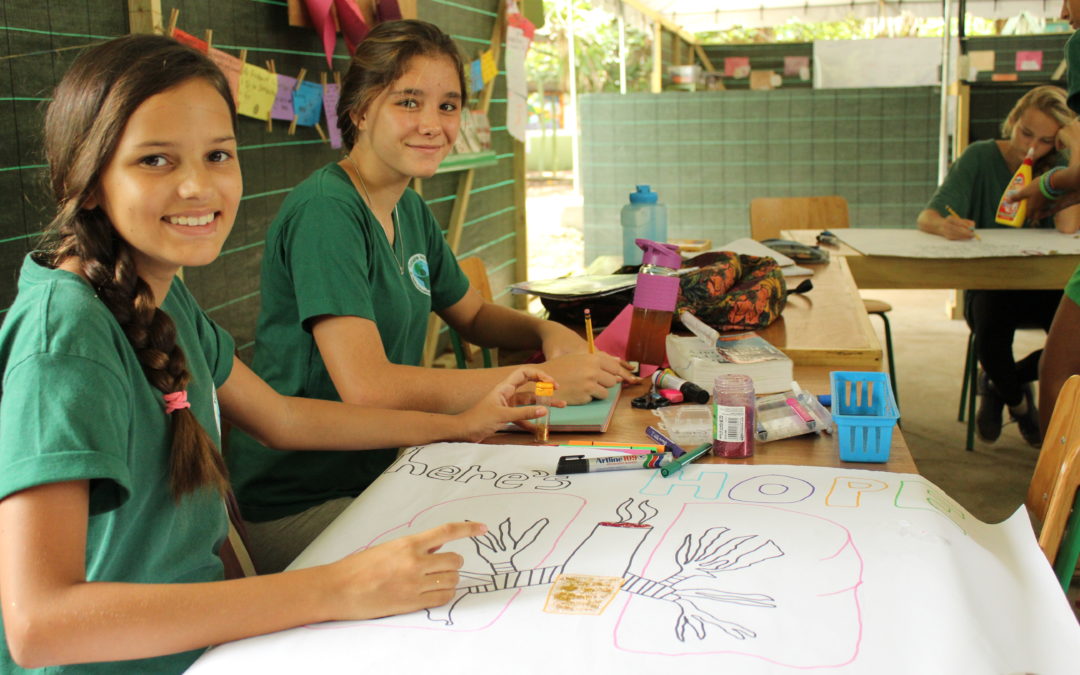
by Stuart Millar, IB coordinator | Jun 18, 2016

Principled: We act with integrity and honesty, with a strong sense of fairness and justice, and with respect for the dignity and rights of people everywhere. We take responsibility for our actions and their consequences. (Taken from IB learner profile)
As parents, teachers, and humans who’ve just lived a lot of life, we know that our actions have consequences. If we take the time to reflect, we can probably all think of an occasion where not acting has also had consequences, and about a time when our choices have not only just affected us, but those around us. No matter how old we are, taking responsibility can sometimes be very tough!
At all ages and stages of a child’s development we might see different things: impulsive behavior with no thought about what the consequences might be; disorganization or lethargy which causes a student to fall behind with their work, leaving them with consequences to contend with; or a tendency to blame others rather than accept responsibility and fault. A lot of what we now know came to us through our own experiences. How do we help our children turn their experiences into positive learning ones?
Take opportunities to help your children reflect. Some questions to get them thinking and discussing might be: Where did things start to go wrong? Could you have predicted those consequences? How have you been affected? How have others been affected? Often, children think the word consequence only has a negative connotation. Point out where good decisions led to good consequences and celebrate those decisions. Finally, as parents and teachers, we should be careful to not only lay out reasonable consequences but consistently enforce them. For example, we all want our students to be successful, but part of being successful is being organized. If there is a deadline, help enforce it and make sure you have the difficult conversation about how conscious actions led to the current situation.
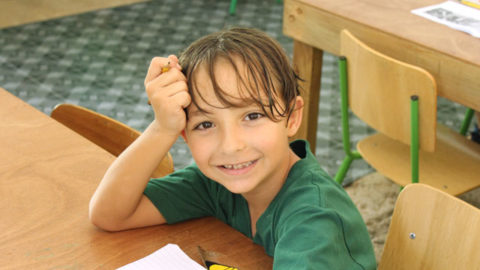
by Stuart Millar, IB coordinator | May 31, 2016

Communicators: We express ourselves confidently and creatively in more than one language and in many ways. We collaborate effectively, listening carefully to the perspectives of other individuals and groups. (Taken from IB learner profile)
At Futuro Verde there certainly are a lot of ways to communicate! With eight different languages at home and three languages of instruction at school, 65% of our students are bilingual or multilingual; staff reflect the same diversity, with approximately half being bilingual. It’s a learning environment with people of all ages and from different backgrounds at their own stage of language development – sharing similar challenges, frustrations and personal victories. Remember! If someone is having a tough time communicating, it doesn’t mean they don’t have a lot to share – it’s just locked away for now. Certainly, do not assume that difficulty in communicating comes from a lack of intelligence!
We’re accustomed to a ‘good’ communicator expressing themselves through speaking and writing. However, spend even a short amount of time at Futuro Verde and you will see that our students use a multitude of ways to communicate. Just as they all learn in different ways, some might feel more comfortable communicating in other ways too. Sometimes you feel you understand most about someone when they are competing, performing, playing their instrument or painting.
Being a good communicator depends on feeling safe to be able to express oneself without fear of criticism or recrimination. Weekly peace practice provides such an environment. Students feel comfortable to share a joke of the day, or something more personal, because they know they are surrounded by other good communicators. Their peers understand that effective communication involves listening respectfully even if they don’t agree.
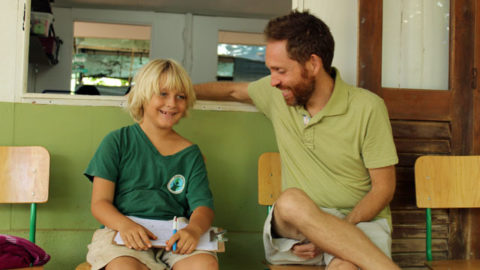
by Stuart Millar, IB coordinator | May 18, 2016
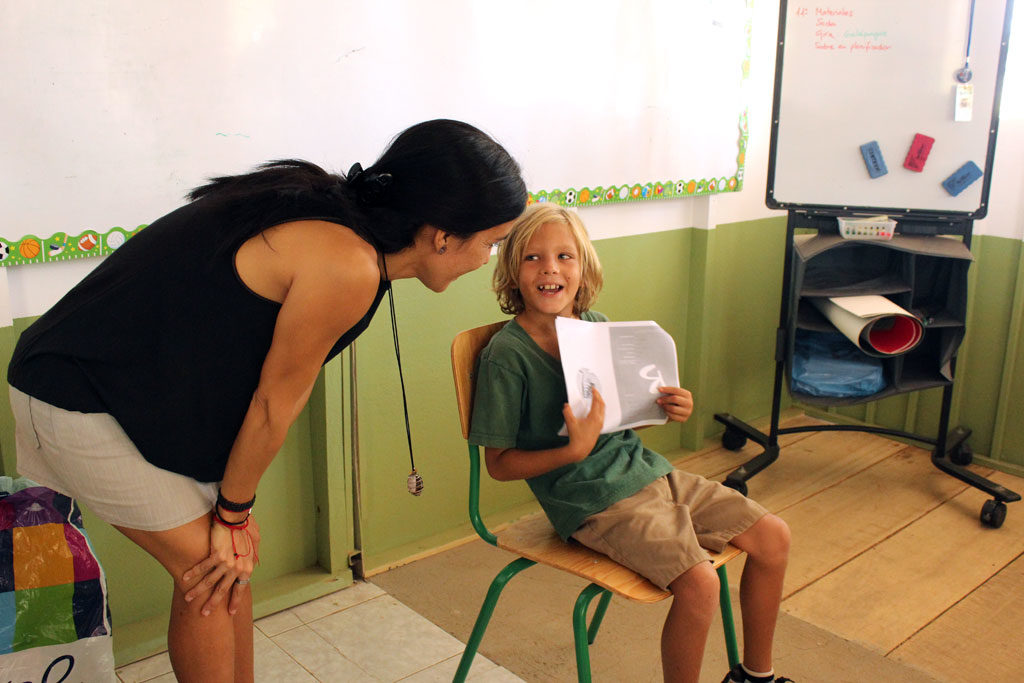
In preparation for submitting our request for authorization to the IB in October we are well underway with teacher professional development. A high class program with successful students comes from having well prepared teachers. Over the next few months teachers will be attending IB workshops in their specific subject areas. In addition, in-school professional development will focus on preparing teachers for these workshops as well as preparing them to write their proposed IB course outlines. Other exciting activities include a visit by our teachers to La Paz Community School in Guanacaste, a bilingual IB school.
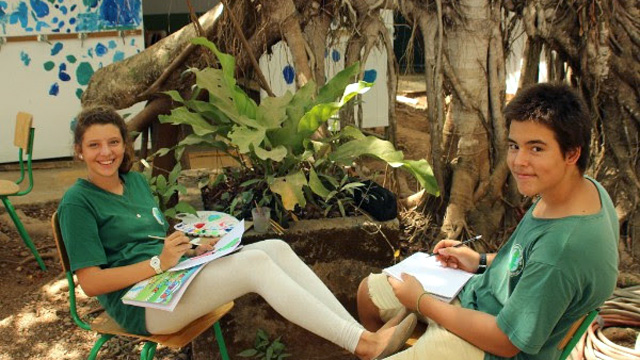
by Stuart Millar, IB coordinator | Apr 1, 2016

Futuro Verde is a candidate school for the International Baccalaureate diploma program*. Over the next few months we will be outlining the different elements of the IB diploma program, and considering how these might come to life at Futuro Verde.
IB’s intention, as it is at Futuro Verde, is to utilize a holistic approach, educating and developing the whole student. In the diploma program this is accomplished not only by offering breadth and depth in traditional academic subjects inside the classroom, but also by exposing students to different experiences that provide them with a multitude of opportunities for personal learning and growth. Just as at Futuro Verde, students are seen as being at the center of their own lifelong educational journey. To receive the IB diploma, students must satisfy the requirements of three core subjects as well as those of the six group subjects. All are seen as having equal importance. The core subjects are: creativity, activity, service (CAS); theory of knowledge (TOK); and the extended essay. The six subject groups are: language and literature; language acquisition; individuals and societies; sciences; mathematics; the arts.
As 10th grade embarks on their community projects it’s a good time to try and understand what creativity, activity, service (CAS) might involve.
-
Creativity – visual and performing arts, digital design, writing, film, crafts and culinary arts. Culminating with an original product or performance.
-
Activity – individual or team sports, dance or outdoor pursuits to contribute to a healthy lifestyle.
-
Service – students identify and tackle a global issue in their local community.
This core subject is supervised by the school’s CAS coordinator over a period of 18 months. Intended to be both fun and personally challenging, CAS involves a blend of individual experiences and a group project. Students will be required to: select their own experiences and project; set goals and objectives; and keep a portfolio containing both pieces of personal reflection and to demonstrate evidence of achieving learning outcomes.
Be sure to follow this year’s 10th grade students through the newsletter and social media as they complete their community projects.
*Centro Educativo Futuro Verde is a candidate school for the Diploma Programme. This school is pursuing authorization as an IB World School. These are schools that share a common philosophy- a commitment to high quality, challenging, international education that Centro Educativo Futuro Verde believes is important for our students.
Only schools authorized by the IB Organization can offer any of its four academic programmes: the Primary Years Programme (PYP), the Middle Years Programme (MYP), the Diploma Programme or the Career-related Programme (CP). Candidate status gives no guarantee that authorization will be granted.
For further information about the IB and its programmes, visit http://www.ibo.org

by Stuart Millar, IB coordinator | Apr 1, 2016

Knowledgeable
We explore concepts, ideas and issues that have local and global significance. In so doing, we acquire in-depth knowledge and develop understanding across a broad and balanced range of disciplines.
Thinkers
We exercise initiative in applying thinking skills critically and creatively to recognize and approach complex problems, and make reasoned, ethical decisions.
New information comes at us at a relentless pace. The BBC reported that the average inhabitant of a Western city is exposed to the same amount of data in one day as a person in the 15th century was in their lifetime*. The challenge for our children is how to process, categorize, and choose to assimilate (or not) this potentially new knowledge.
Teachers at Futuro Verde help students question what they already know, decide what they would like to know, and assist them in integrating that new information. Critical thinking skills are vital as students compare and contrast different information they find, evaluate it for bias and ultimately decide, consciously or subconsciously, whether or not this new knowledge will be retained.
Lural Ramírez, Director, recently attended an IB workshop in Theory of knowledge (TOK). As she starts to share from her experiences at this training, all staff and students are being encouraged to reflect on how we know what we claim to know. This comes through analyzing: the distinction between shared knowledge and personal knowledge; our ways of knowing (emotion, reason, imagination, faith, intuition, memory, language, and sense perception); and our areas of knowledge (mathematics, natural sciences, human sciences, the arts, history, ethics, religious knowledge systems, and indigenous knowledge systems).
To support their students, parents and guardians might also take the opportunity to reflect when stating with conviction what they think they know. Model and share with your children how you believe you came to know something, and be open and honest about how your memory, emotion, faith etc. might have influenced that process.
*Vince, Gaia. “Cities: How Crowded Life Is Changing Us.” BBC. BBC, 17 May 2013. Web. 24 Mar. 2016. <http://www.bbc.com/future/story/20130516-how-city-life-is-changing-us>.
Dunn, Michael. “Critical thinking and the IB Diploma.” 14th October 2014. Last accessed: 24th March 2016. <http://www.theoryofknowledge.net/about/the-tok-course/critical-thinking-ib-diploma/>












